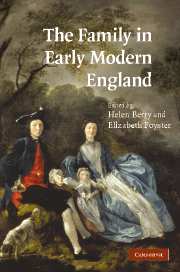Book contents
- Frontmatter
- Contents
- Preface
- Notes on contributors
- Anthony Fletcher
- 1 Introduction
- 2 Marriage, separation and the common law in England, 1540–1660
- 3 Republican reformation: Family, community and the state in Interregnum Middlesex, 1649–60
- 4 Keeping it in the family: Crime and the early modern household
- 5 Faces in the crowd: Gender and age in the early modern English crowd
- 6 ‘Without the cry of any neighbours’: A Cumbrian family and the poor law authorities, c.1690–1730
- 7 Childless men in early modern England
- 8 Aristocratic women and ideas of family in the early eighteenth century
- 9 Reassessing parenting in eighteenth-century England
- Select bibliography
- Index
3 - Republican reformation: Family, community and the state in Interregnum Middlesex, 1649–60
Published online by Cambridge University Press: 31 July 2009
- Frontmatter
- Contents
- Preface
- Notes on contributors
- Anthony Fletcher
- 1 Introduction
- 2 Marriage, separation and the common law in England, 1540–1660
- 3 Republican reformation: Family, community and the state in Interregnum Middlesex, 1649–60
- 4 Keeping it in the family: Crime and the early modern household
- 5 Faces in the crowd: Gender and age in the early modern English crowd
- 6 ‘Without the cry of any neighbours’: A Cumbrian family and the poor law authorities, c.1690–1730
- 7 Childless men in early modern England
- 8 Aristocratic women and ideas of family in the early eighteenth century
- 9 Reassessing parenting in eighteenth-century England
- Select bibliography
- Index
Summary
On 18 June 1658 a Middlesex justice bound over Priscilla Frotheringham:
for being a notorious strumpet, a common field walker and one that hath undone several men by giving them the foul disease, for keeping the husband of Susan Slaughter from her ever since December last and hath utterly undone that family, and also for threatening to stab the said Susan Slaughter when ever she can meet her, the woman being a very civil woman, and also for several other notorious wickednesses which is not fit to be named among the heathen.
‘Binding over’ was a common legal procedure, making the subject financially liable for any further misconduct before the next meeting of the relevant court. But the emotional language of the issuing magistrate, Thomas Hubbert, was far removed from the dry formulae usual in such documents, and betrays his deep disgust at Priscilla's alleged behaviour. For men such as Hubbert, ‘godly reformation’ meant not Lawrence Stone's repressive package of ‘anti-pleasure principles’ but a crusade against vices that were destroying families and poisoning society. An Independent lay preacher, Hubbert had already penned a diatribe attacking those who paid merely lip-service to piety while failing to act against vice and profanity. But if Hubbert embodies godly reformation, Priscilla Frotheringham, a victualler's wife, personifies the challenge it faced. She and her husband Edmund appear repeatedly in the sessions records for gaming, tippling, disorder, and running a suspected bawdy-house.
- Type
- Chapter
- Information
- The Family in Early Modern England , pp. 40 - 66Publisher: Cambridge University PressPrint publication year: 2007
- 1
- Cited by

